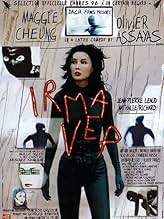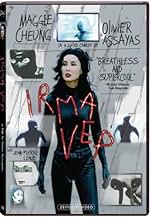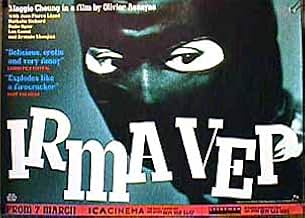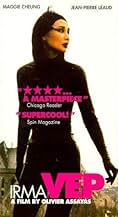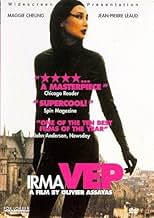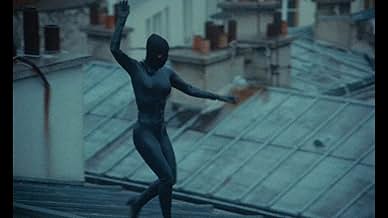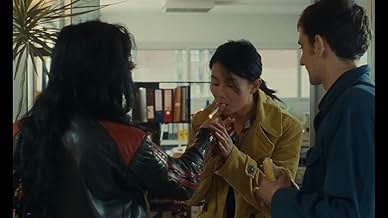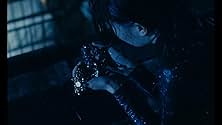IMDb-BEWERTUNG
7,0/10
10.419
IHRE BEWERTUNG
Eine chinesische Filmschauspielerin, die in Frankreich in einem Remake von "Les Vampires" zu sehen ist, findet am Set kleine Intrigen und kollidierende Egos.Eine chinesische Filmschauspielerin, die in Frankreich in einem Remake von "Les Vampires" zu sehen ist, findet am Set kleine Intrigen und kollidierende Egos.Eine chinesische Filmschauspielerin, die in Frankreich in einem Remake von "Les Vampires" zu sehen ist, findet am Set kleine Intrigen und kollidierende Egos.
- Regie
- Drehbuch
- Hauptbesetzung
- Auszeichnungen
- 2 Gewinne & 3 Nominierungen insgesamt
Empfohlene Bewertungen
Irma Vep is a film about film-making, an insightful and disturbing film which delivers some beautiful voyeuristic glimpses of vampirism, realist cinema, gritty black-and-white cine-retro and the old men who were once the chic of the French avant-garde film clique.
IMDb says: "Rene Vidal, a director in decline, decides to remake Louis Feuillade's silent serial Les Vampires" but this summary does not mention the real star of the film - Hong Kong kung-fu actress Maggie Cheung, playing herself. She is perfect as the exotic object, the ephemeral other, the object of desire who finds herself at the centre of the film's obsessive and sexually driven visual vortex.
In the privacy of her hotel room, Maggie Cheung zips herself into a full-body black latex catsuit which is going to be her vampire costume on the film set the next day. Maybe she is just getting into character, or maybe she shares something of the director's fascination with nocturnal life... predatory sexuality... visual fixation... the bound female form... anyway, the film really comes to life as she creeps through the hotel, her haunting feline eyes piercing through the spooky-sexy costume... the suspense here is that she is enacting her own vampire fantasy, of her own accord, not under the director's gaze. Maggie Cheung, all alone, on the roof, in the rain, exploring her own version of a male fantasy sequence. This is an unforgettable moment in art-house cinema.
The film really does justice to its themes, with the male characters degenerating from visionaries into voyeurs, and the female characters showing real depth in their willingness to accommodate the male gaze without losing their savvy post-fem powers. If you are a predictable guy like me, you will love the French-Asian grrrl power, which gives the film a pulse.
The theme of visual obsession is presented very well: the director is shouting, the cameras are rolling, and Maggie Cheung, in her catsuit, is ready to suck blood. In these moments she is bound but free, powerless but in control, objectified but liberated. I suppose this makes the film contentious and provocative, but I thought the message was very clear.
Without spoiling the end of the film: the last five minutes of Irma Vep is totally unique. You will never see another film which ends like this one. I can only describe it as a profoundly futile gesture, an act of great passion and impotence, and a brilliant moment in Lettrist art. It is Rene Vidal's last stand, a terrible but beautiful moment caught on celluloid: the work of a madman? a savant? a genius? you can decide, but I am sure you will agree that Irma Vep does a lot more than just scratch the surface of modern film art.
If you like Irma Vep, check out Shadow Of The Vampire as well.
IMDb says: "Rene Vidal, a director in decline, decides to remake Louis Feuillade's silent serial Les Vampires" but this summary does not mention the real star of the film - Hong Kong kung-fu actress Maggie Cheung, playing herself. She is perfect as the exotic object, the ephemeral other, the object of desire who finds herself at the centre of the film's obsessive and sexually driven visual vortex.
In the privacy of her hotel room, Maggie Cheung zips herself into a full-body black latex catsuit which is going to be her vampire costume on the film set the next day. Maybe she is just getting into character, or maybe she shares something of the director's fascination with nocturnal life... predatory sexuality... visual fixation... the bound female form... anyway, the film really comes to life as she creeps through the hotel, her haunting feline eyes piercing through the spooky-sexy costume... the suspense here is that she is enacting her own vampire fantasy, of her own accord, not under the director's gaze. Maggie Cheung, all alone, on the roof, in the rain, exploring her own version of a male fantasy sequence. This is an unforgettable moment in art-house cinema.
The film really does justice to its themes, with the male characters degenerating from visionaries into voyeurs, and the female characters showing real depth in their willingness to accommodate the male gaze without losing their savvy post-fem powers. If you are a predictable guy like me, you will love the French-Asian grrrl power, which gives the film a pulse.
The theme of visual obsession is presented very well: the director is shouting, the cameras are rolling, and Maggie Cheung, in her catsuit, is ready to suck blood. In these moments she is bound but free, powerless but in control, objectified but liberated. I suppose this makes the film contentious and provocative, but I thought the message was very clear.
Without spoiling the end of the film: the last five minutes of Irma Vep is totally unique. You will never see another film which ends like this one. I can only describe it as a profoundly futile gesture, an act of great passion and impotence, and a brilliant moment in Lettrist art. It is Rene Vidal's last stand, a terrible but beautiful moment caught on celluloid: the work of a madman? a savant? a genius? you can decide, but I am sure you will agree that Irma Vep does a lot more than just scratch the surface of modern film art.
If you like Irma Vep, check out Shadow Of The Vampire as well.
I just watched Irma Vep last night. And I have to say that I enjoyed watching this movie for many reasons. Evidently Maggie is one of the reasons. Beautiful of course and good actress to boot. But beyond that, we have a lot of other things that kept my interest alive all along. This movie presents a self examination of French movie making, thereby justifying the accusation of "nombrilisme" (narcissism) by the reporter interviewing Maggy. This seems to be one of the themes here. A close look at the movie making process in France where a certain lack of coordination seems to be the rule, where a director launches the movie making only based on a whim. And in this case, it's the idea of having Maggie Cheung play the main role of a character in a remake of a 1915 silent movie. What really becomes interesting is the way she gets into the role and really becomes Irma. But I will leave you to discover how and when. At any rate, the movie has the funny effect to make you wonder if French movie making is in that bad a state that it can come up with such an interesting product.
French director Jean-Pierre Léaud decides to remake Feuillade's silent serial LES VAMPIRES as a modern feature. He decides to cast Maggie Cheung as Irma Vep based on seeing her in one movie in Marrakesh. When the movie opens, Miss Cheung has just arrived at Léaud's office in the last throes of pre-production, whence she is whisked away to a sex shop to buy a gimp suit to be modified for her costume. After that, things become chaotic, with spoiled takes, spoiled tempers and journalists who lecture her on how to make films.
Miss Cheung is wonderful in the role, a sweet-faced, slightly puzzled woman stranded alone in Paris, trying to perform her part in her first international production, while chaos swirls about her.
There is a lovely, impromptu feel about Olivier Assayas' movie. It feels as if he started out trying to do the remake, and as that became impossible, switched to a different film. That seems unlikely. Undoubtedly that was the look and feel he was trying for. The result is an amusing, slightly tentative effort that makes me wish to look at LES VAMPIRES again.
Miss Cheung is wonderful in the role, a sweet-faced, slightly puzzled woman stranded alone in Paris, trying to perform her part in her first international production, while chaos swirls about her.
There is a lovely, impromptu feel about Olivier Assayas' movie. It feels as if he started out trying to do the remake, and as that became impossible, switched to a different film. That seems unlikely. Undoubtedly that was the look and feel he was trying for. The result is an amusing, slightly tentative effort that makes me wish to look at LES VAMPIRES again.
This truly is a film for film elites. I really enjoy films about human relationships and films about social injustice. I don't enjoy uber-intellectual movies that discuss film-making in a way that can be understood by only a limited number of folks who are keyed into interpretions of art house films. This is not a film for a wide audience, though at best it makes the uninitiated curious. Overall, films made for a select few should be available to the select few only. The rest of us who stumble on it at our local video store sit for a painful 96 minutes waiting for the plot and story to congeal enough for us to understand what the heck it's all about. We come out empty-handed in the end. It is a waste and it isn't. I know what people are bitching about with regards to intellectual French films, but then again, I'm not sure if I really care.
I feel downright churlish for not going completely crazy for this funny/sad look at movie- making -- specifically the rather absurd, doomed remaking of a real French classic, by an aging, out of style art-house director, starring Hong Kong action heroine Maggie Chung, who plays herself delightfully.
I enjoyed the film; its sort of a complex 1990s 'Day for Night', with a paradoxical and sometimes confusing point of view about the nature of art and the state of film.
But I couldn't see it for the masterpiece a number of intelligent critics gave it credit for being. Jonathan Rosenbaum, the terrific critic from the Chicago Reader wrote a very long, in depth analysis that went right over my head, and then added insult to injury by implying that people who don't see the film as a deep investigation of the evils of capitalism, and the meaning of ART are somehow shallow.
I'm also surprised by the number of people who take the ramblings of an obnoxious reporter character in the film about the death of French art cinema as being the film's point of view on these issues. To me the film isn't taking sides, and seems to be gently satirizing, and yet embracing all of film.
Good natured, well acted, and occasionally brave (but also occasionally obscure) I quite enjoyed this and it did provoke some thinking. But I couldn't see it as the super deep film some did. For me, it was fun, but the ideas are far less deep or radical then critics seem to want to give them credit for being.
I enjoyed the film; its sort of a complex 1990s 'Day for Night', with a paradoxical and sometimes confusing point of view about the nature of art and the state of film.
But I couldn't see it for the masterpiece a number of intelligent critics gave it credit for being. Jonathan Rosenbaum, the terrific critic from the Chicago Reader wrote a very long, in depth analysis that went right over my head, and then added insult to injury by implying that people who don't see the film as a deep investigation of the evils of capitalism, and the meaning of ART are somehow shallow.
I'm also surprised by the number of people who take the ramblings of an obnoxious reporter character in the film about the death of French art cinema as being the film's point of view on these issues. To me the film isn't taking sides, and seems to be gently satirizing, and yet embracing all of film.
Good natured, well acted, and occasionally brave (but also occasionally obscure) I quite enjoyed this and it did provoke some thinking. But I couldn't see it as the super deep film some did. For me, it was fun, but the ideas are far less deep or radical then critics seem to want to give them credit for being.
Wusstest du schon
- WissenswertesMuch of the film depicts set-related incidents that echo scenes in François Truffaut's Die amerikanische Nacht (1973), to which Irma Vep owes a large thematic debt. However, Olivier Assayas publicly stated that although he considers Die amerikanische Nacht (1973) a great film, it is more about the fantasy of filmmaking than the reality. Assayas credits Rainer Werner Fassbinder's Warnung vor einer heiligen Nutte (1971) as a greater inspiration.
- PatzerAfter René says, "respect the silence" to Maggie, he speaks to a woman and takes a drink from a big plastic Coke bottle. He screws the cap on, then hands her the bottle. She turns around, and the cap is missing.
- VerbindungenFeatured in Der siebte Himmel (1997)
Top-Auswahl
Melde dich zum Bewerten an und greife auf die Watchlist für personalisierte Empfehlungen zu.
- How long is Irma Vep?Powered by Alexa
Details
Box Office
- Bruttoertrag in den USA und Kanada
- 282.310 $
- Eröffnungswochenende in den USA und in Kanada
- 11.852 $
- 4. Mai 1997
- Weltweiter Bruttoertrag
- 315.015 $
- Laufzeit
- 1 Std. 39 Min.(99 min)
- Farbe
- Sound-Mix
- Seitenverhältnis
- 1.66 : 1
Zu dieser Seite beitragen
Bearbeitung vorschlagen oder fehlenden Inhalt hinzufügen


